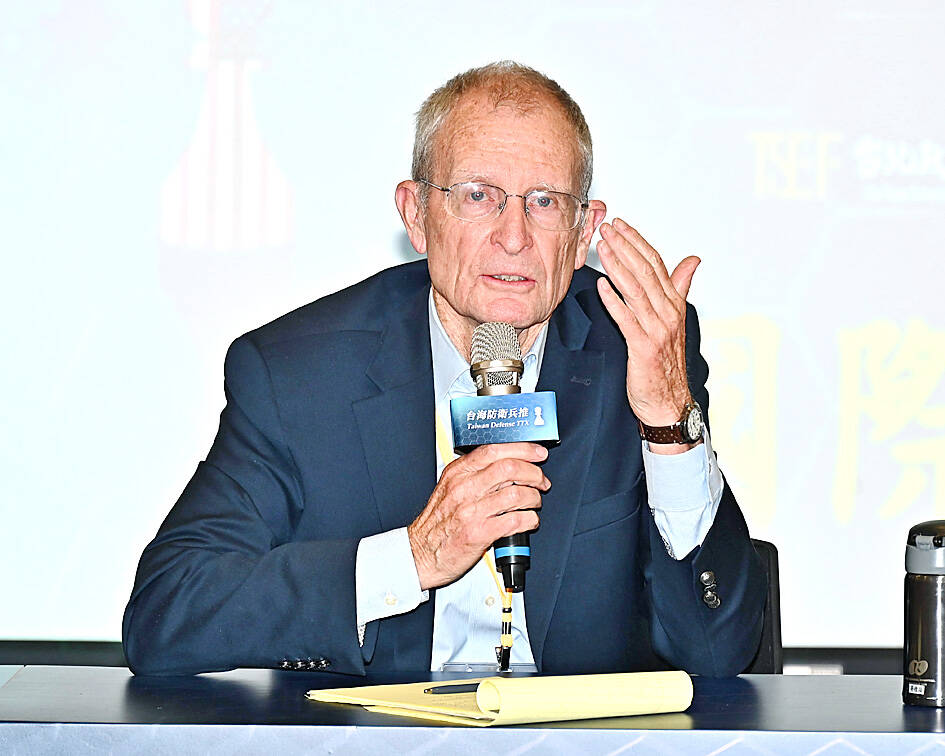The increase in Taiwan’s military capabilities and willingness to defend itself makes it “much more likely” that the US would come to its aid in the event of a Chinese attack, retired US admiral Dennis Blair said yesterday.
Blair, who is in Taipei to participate in a civilian-organized tabletop exercise, was responding to a reporter asking team leaders of the exercise to gauge US willingness to help defend Taiwan in the event of a Chinese invasion.
Two factors would influence a US president’s decision on whether to help defend Taiwan in such a scenario: how the conflict starts and whether Taiwan has the ability and willingness to defend itself, said Blair, a former US Pacific fleet commander.

Photo: Tu Chien-rong, Taipei Times
The second factor would “have a great deal of effect” on whether the US would become involved, he said.
“I’ve been coming to Taiwan for the most recent 20 years, participating in Taiwanese exercises, observing Taiwan, and I certainly see that the ability of Taiwan to defend itself, to defend against Chinese aggression, the willingness to do so has been increasing,” he said. “And that would mean that the United States would be much more likely to come to the assistance of Taiwan under this matter of great concern.”
He referenced pledges by former US president Joe Biden and a remark by US Secretary of Defense Pete Hegseth at the Shangri-La Dialogue in Singapore that the US would use military force to defend Taiwan in the event of a Chinese invasion as indications of the US’ commitment to Taiwan’s defense.
Blair, a former US national intelligence director, also referenced the Taiwan Relations Act, which, in addition to stating that the US would ensure Taiwan has sufficient defense capabilities, states that the US considers any effort to determine the future of Taiwan by non-peaceful means a matter of “grave concern.”
“This means it may involve military force,” he said.
However, if the conflict was triggered by Taiwanese provocations, such as moves toward independence, the US would be less likely to become involved, he added.
For the Taiwanese and US governments, the objective is to deter, prevent and discourage any kind of Chinese aggression by having enough capability, and by making it clear that “we would fight if it comes to that,” he said.
From 2003 to 2007, Blair participated in the Han Kuang military exercises as a senior observer, during which he made suggestions to Taiwan that completed the infrastructure of the critical drills, including the adoption of the Joint Theater Level Simulation computerized war-gaming system and the Joint Training System, former chief of the general staff Lee Hsi-min (李喜明) said.
Lee heads the Taipei-based think tank Center for Peace and Security, one of the organizers of the war games.

CHAOS: Iranians took to the streets playing celebratory music after reports of Khamenei’s death on Saturday, while mourners also gathered in Tehran yesterday Iranian Supreme Leader Ayatollah Ali Khamenei was killed in a major attack on Iran launched by Israel and the US, throwing the future of the Islamic republic into doubt and raising the risk of regional instability. Iranian state television and the state-run IRNA news agency announced the 86-year-old’s death early yesterday. US President Donald Trump said it gave Iranians their “greatest chance” to “take back” their country. The announcements came after a joint US and Israeli aerial bombardment that targeted Iranian military and governmental sites. Trump said the “heavy and pinpoint bombing” would continue through the week or as long

TRUST: The KMT said it respected the US’ timing and considerations, and hoped it would continue to honor its commitments to helping Taiwan bolster its defenses and deterrence US President Donald Trump is delaying a multibillion-dollar arms sale to Taiwan to ensure his visit to Beijing is successful, a New York Times report said. The weapons sales package has stalled in the US Department of State, the report said, citing US officials it did not identify. The White House has told agencies not to push forward ahead of Trump’s meeting with Chinese President Xi Jinping (習近平), it said. The two last month held a phone call to discuss trade and geopolitical flashpoints ahead of the summit. Xi raised the Taiwan issue and urged the US to handle arms sales to

A magnitude 5.6 earthquake struck off the coast of Yilan County at 12:37pm today, with clear shaking felt across much of northern Taiwan. There were no immediate reports of damage. The epicenter of the quake was 16.9km east-southeast of Yilan County Hall offshore at a depth of 66.8km, Central Weather Administration (CWA) data showed. The maximum intensity registered at a 4 in Yilan County’s Nanao Township (南澳) on Taiwan’s seven-tier scale. Other parts of Yilan, as well as certain areas of Hualien County, Taipei, New Taipei City, Taoyuan, Hsinchu County, Taichung and Miaoli County, recorded intensities of 3. Residents of Yilan County and Taipei received

Taiwan has secured another breakthrough in fruit exports, with jujubes, dragon fruit and lychees approved for shipment to the EU, the Ministry of Agriculture said yesterday. The Animal and Plant Health Inspection Agency on Thursday received formal notification of the approval from the EU, the ministry said, adding that the decision was expected to expand Taiwanese fruit producers’ access to high-end European markets. Taiwan exported 126 tonnes of lychees last year, valued at US$1.48 million, with Japan accounting for 102 tonnes. Other export destinations included New Zealand, Hong Kong, the US and Australia, ministry data showed. Jujube exports totaled 103 tonnes, valued at